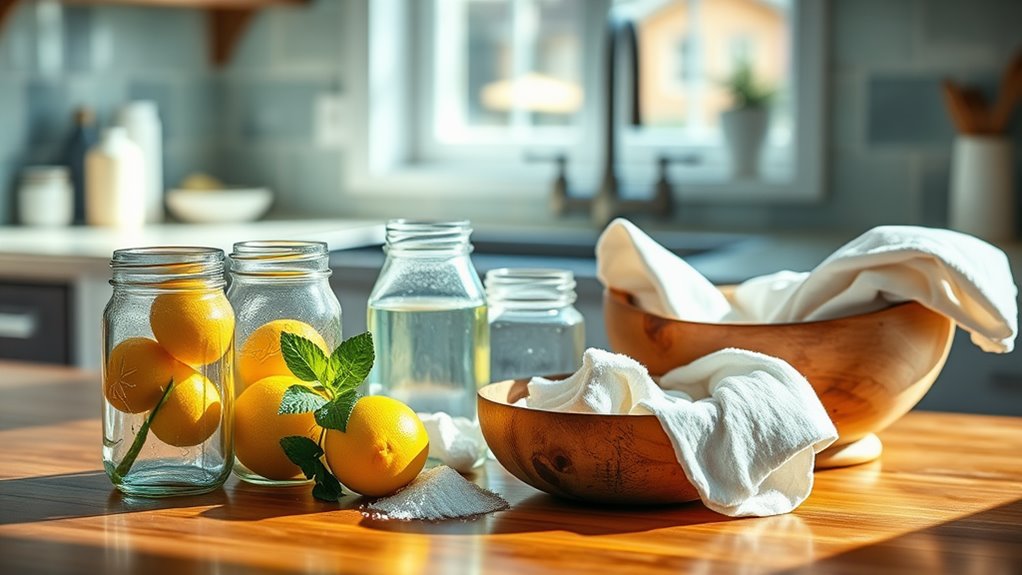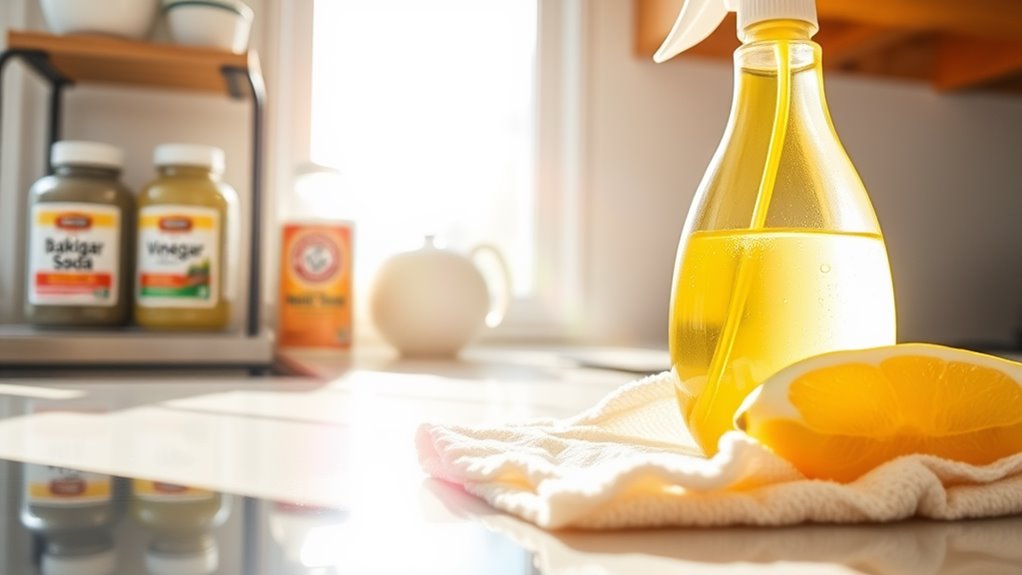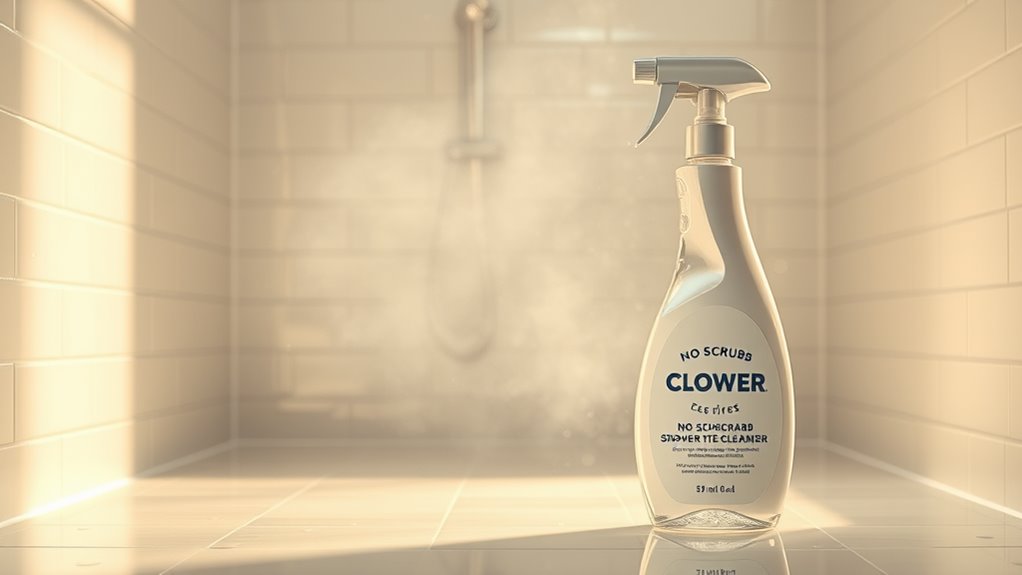10 Budget Hacks for a Clean Home Without Expensive Products
You can achieve a clean home without spending a fortune by using budget-friendly hacks. Baking soda works wonders for cleaning and deodorizing, while vinegar serves as a natural disinfectant. Freshen up your space with lemon juice and polish furniture using olive oil. For streak-free windows, cornstarch is your go-to. Rubbing alcohol tackles tough stains, and homemade air fresheners keep your space smelling great. Stick around, and you’ll discover even more tips to enhance your cleaning routine.
Key Takeaways
- Utilize baking soda mixed with vinegar for an effective, natural cleaner that tackles tough messes and deodorizes spaces affordably.
- Create DIY cleaning solutions using distilled water and essential oils for a budget-friendly way to freshen surfaces and air.
- Use cornstarch for streak-free windows by mixing it with vinegar and water, providing an economical option for sparkling glass.
- Combine olive oil and vinegar for a natural wood polish that nourishes and protects without harmful chemicals.
- Harness essential oils in a diffuser or as a spray to enhance your cleaning routine with pleasant aromas while promoting relaxation.
Baking Soda: The Versatile Cleaning Agent
Baking soda is a powerhouse in your cleaning arsenal. This versatile agent is perfect for budget cleaning, offering a cost-effective solution to tackle tough messes. You can use it to deodorize carpets, freshen your fridge, and even scrub stubborn stains from surfaces. Simply sprinkle some baking soda on the area, let it sit, and wipe it away for impressive results. Additionally, it can be used to unclog drains naturally, making it an even more valuable tool for maintaining a clean home. It’s important to note that when combined with vinegar and baking soda, their effectiveness can be diminished due to their neutralizing reaction. Mixing baking soda with vinegar can create a powerful foaming action that helps lift dirt and grime more effectively.
For a gentle abrasive cleaner, mix baking soda with water to form a paste. This works wonders on sinks, stovetops, and even bathroom tiles. You’ll find it’s especially effective in eliminating grease and grime without harsh chemicals. In fact, when combined with vinegar and lemon, baking soda can enhance its cleaning power even further.
Mastering the art of using baking soda not only saves you money but also promotes a healthier, cleaner environment for your home.
Vinegar: A Natural Disinfectant
When it comes to natural cleaning solutions, vinegar stands out as a powerful disinfectant. Its acetic acid effectively kills bacteria and viruses, making it an ideal choice for your home. You can use it to sanitize countertops, cutting boards, and bathroom surfaces. Additionally, vinegar is effective against mold and mildew, which can thrive in damp areas of your home. Furthermore, vinegar can be used as an eco-friendly floor cleaner that leaves your floors spotless and shining.
Simply mix equal parts vinegar and water in a spray bottle, and you’re ready to tackle germs. For tougher stains, apply undiluted vinegar directly to the spot, let it sit for a few minutes, and wipe clean. Vinegar is a powerful natural cleaning alternative that can also help to break down grease and grime. It is also an affordable option compared to commercial cleaning products, which can be filled with harsh chemicals.
Don’t forget to ventilate the area, as the strong smell dissipates quickly. Additionally, you can enhance your vinegar cleaner’s effectiveness by adding essential oils, which provide antibacterial properties and a pleasant fragrance.
With vinegar, you’re not only saving money but also embracing a safe, chemical-free way to maintain a clean, healthy environment that’s effective and easy to master.
Lemon Juice: Freshening Up Your Space
Although you might not think of it right away, lemon juice is a fantastic natural cleaner that can freshen up your space. Its acidity cuts through grime, while its fresh scent invigorates your environment. Here’s how you can utilize lemon juice effectively:
| Use Case | Method | Benefits |
|---|---|---|
| Surface Cleaner | Mix with water and spray on surfaces | Cuts grease, freshens scent |
| Odor Neutralizer | Place lemon halves in the fridge | Eliminates unpleasant smells |
| Stain Remover | Apply directly to stains, let sit, rinse | Works wonders on fabrics |
| Dish Cleaner | Add to dish soap for extra power | Boosts grease-fighting ability |
| Air Freshener | Simmer lemon peels in water | Naturally freshens the air |
Embrace lemon juice for a budget-friendly cleaning solution! Additionally, it can be combined with natural ingredients to create an effective all-purpose cleaner for your kitchen appliances. Using lemon juice in cleaning products not only enhances their efficacy but also introduces natural sanitizing properties that keep your home safe and fresh. Furthermore, lemon juice is known for its antimicrobial effects which can help eliminate bacteria and viruses on surfaces. When mixed with vinegar and essential oils, it can create a powerful cleaning solution that tackles tough messes effortlessly. Natural alternatives like lemon juice are a great way to maintain cleanliness without relying on harsh chemicals.
Olive Oil: A Furniture Polish Alternative
After freshening up your space with lemon juice, consider using olive oil as a natural alternative for polishing your furniture. This simple ingredient not only nourishes wood but also adds a beautiful shine.
To make your own polish, mix equal parts olive oil and vinegar in a spray bottle. Shake well before applying it to a soft cloth, and then gently buff your furniture. The oil penetrates the wood, protecting it from drying out, while the vinegar helps to cut through grime.
Plus, it’s eco-friendly and free from harmful chemicals. Regular use keeps your furniture looking pristine and extends its life. You’ll master the art of natural cleaning while saving money—what’s not to love? Additionally, using homemade cleaners like this can significantly reduce your exposure to harmful chemicals found in commercial cleaners.
Cornstarch: For Streak-Free Windows
How can you achieve spotless, streak-free windows without spending a fortune? Cornstarch is your secret weapon! This versatile pantry staple can help you clean your windows effectively and affordably. Here’s how to master the technique:
-
Mix a solution: Combine 1 tablespoon of cornstarch with 2 cups of water and a splash of vinegar in a spray bottle.
-
Spray and wipe: Generously spray the mixture onto your windows and use a clean, soft cloth to wipe it down, ensuring you’re using a circular motion.
-
Buff for shine: For that perfect finish, buff the glass with a dry, lint-free cloth.
Using cornstarch not only saves money but also leaves your windows crystal clear. Enjoy the view!
Essential Oils: Adding a Pleasant Aroma
Adding essential oils to your cleaning routine can transform your home with delightful aromas while keeping it fresh.
You can easily create DIY cleaning solutions that not only disinfect but also uplift your mood through aromatherapy benefits.
Let’s explore how these natural scents can enhance your cleaning experience!
Natural Aroma Enhancement
A few drops of essential oils can transform your home into a fragrant oasis, creating an inviting atmosphere that masks unwanted odors.
To enhance your space naturally, consider these methods:
-
Diffusion: Use an essential oil diffuser to disperse your favorite scents throughout the room. Choose oils like lavender for relaxation or citrus for an energizing boost.
-
Spray: Mix water with essential oils in a spray bottle. Lightly mist your linens, upholstery, or air to refresh the scent in any area.
-
Cotton Balls: Soak cotton balls in essential oils and place them in closets or drawers. They’ll subtly release fragrance without overwhelming the space.
DIY Cleaning Solutions
While keeping your home clean is essential, you can also infuse your cleaning routine with delightful scents using DIY solutions. Essential oils are your best allies here.
Start by mixing a cup of distilled water with 10-15 drops of your favorite essential oil, like lavender or lemon, in a spray bottle. This concoction not only cleans surfaces but also leaves a revitalizing aroma.
For a deeper clean, combine one cup of vinegar, one cup of water, and 10 drops of tea tree oil. This powerful blend tackles germs while imparting a subtle scent.
Aromatherapy Benefits
Incorporating essential oils into your cleaning routine not only enhances the scent of your home but also brings numerous aromatherapy benefits.
By choosing the right oils, you can elevate your environment and promote well-being. Here are three key benefits:
-
Stress Relief: Scents like lavender and chamomile can soothe your mind, reducing tension and anxiety as you clean.
-
Enhanced Focus: Oils like rosemary and peppermint stimulate your senses, helping you stay alert and concentrated while tackling chores.
-
Mood Enhancement: Citrus oils, such as lemon and orange, uplift your spirits, creating a positive atmosphere in your space.
Utilizing essential oils is a budget-friendly way to create a clean, inviting home while reaping these aromatherapy advantages.
Dish Soap: A Powerful All-Purpose Cleaner
When you’re looking for a budget-friendly solution to keep your home spotless, dish soap proves to be an unexpected hero. This versatile cleaner can tackle everything from greasy pots to grimy countertops. Simply mix a few drops with warm water, and you’ve got an effective cleaning solution that won’t break the bank.
Here’s a quick reference table to maximize your dish soap usage:
| Surface | Mix Ratio | Cleaning Method |
|---|---|---|
| Kitchen Counters | 1 tsp per 1 cup | Wipe with a cloth |
| Dishes | 1 tbsp per sink | Soak, scrub, rinse |
| Floors | 1/4 cup per gallon | Mop with warm water |
| Bathroom | 1 tsp per spray bottle | Spray and wipe down |
Harnessing the power of dish soap can transform your cleaning routine!
Rubbing Alcohol: Effective Stain Remover
When it comes to tackling tough stains, rubbing alcohol is a game changer.
You’ll want to learn some effective stain removal techniques and safe usage tips to make the most of this household staple.
Let’s explore how you can keep your surfaces clean without breaking the bank.
Stain Removal Techniques
While stains can seem intimidating, rubbing alcohol proves to be a powerful ally in your cleaning arsenal. It’s effective and budget-friendly, making it perfect for tackling various stains.
Here’s how to use it effectively:
-
Identify the stain: Determine whether it’s ink, grease, or another type. This helps you apply the right technique.
-
Prepare the area: Blot the stain with a clean cloth to remove excess material. Avoid rubbing, as it can spread the stain.
-
Apply rubbing alcohol: Dampen a cloth with rubbing alcohol and gently dab the stain. Work from the outside in to prevent spreading.
With these techniques, you’ll master stain removal and keep your home looking pristine without breaking the bank!
Safe Usage Tips
Mastering stain removal with rubbing alcohol is just the beginning; using it safely is equally important.
First, always test a small, inconspicuous area before applying it to your fabric or surface. This guarantees it won’t damage or discolor your material.
When using rubbing alcohol, work in a well-ventilated area to avoid inhaling fumes. Wear gloves to protect your skin, especially if you’re dealing with tougher stains.
Apply the alcohol with a clean cloth or cotton ball, dabbing gently to lift the stain without spreading it. Avoid mixing it with other cleaners, as this can create dangerous reactions.
Finally, store rubbing alcohol away from heat sources to guarantee safety. Following these tips will help you harness its power effectively and safely.
Homemade Air Fresheners: Simple and Affordable
Creating a fresh-smelling home doesn’t have to break the bank, especially when you can whip up your own air fresheners using simple ingredients.
Here are three easy recipes to elevate your space:
-
Citrus Spray: Combine 1 cup of water, the zest of an orange or lemon, and a few drops of essential oil. Mix and spray around your home for a invigorating scent.
-
Herb Infusion: Boil 2 cups of water with fresh herbs like rosemary or mint. Let it cool, strain, and store in a spray bottle for a natural aroma.
-
Baking Soda Freshener: Mix 1 cup of baking soda with a few drops of your favorite essential oil. Place it in an open jar to absorb odors while adding fragrance.
Master these recipes, and enjoy a delightful ambiance!
Microfiber Cloths: An Eco-Friendly Cleaning Tool
If you’re looking for a sustainable cleaning solution, microfiber cloths are a great choice.
They’re reusable and can save you money over time, making them an eco-friendly option for your home.
Plus, they effectively trap dirt and dust without needing harsh chemicals.
Sustainable Cleaning Solution
While traditional cleaning tools can contribute to waste and chemical exposure, microfiber cloths offer a sustainable solution that benefits both your home and the environment.
These cloths are made from tiny fibers that trap dirt and dust effectively, reducing the need for chemical cleaners. Here’s why you should make the switch:
-
Reusable: Microfiber cloths can be washed and reused hundreds of times, cutting down on waste.
-
Versatile: Use them on various surfaces—kitchen counters, windows, or even your car.
-
Eco-Friendly: They require less water and no harmful chemicals, making them safer for you and the planet.
Embrace microfiber cloths to elevate your cleaning game while making a positive impact!
Reusable and Cost-Effective
Not only are microfiber cloths eco-friendly, but they also save you money in the long run.
These versatile tools can tackle almost any cleaning task without the need for harsh chemicals. By using just water, you can effectively remove dirt and grime from surfaces, leaving your home spotless.
Unlike paper towels, which you toss after one use, microfiber cloths are washable and reusable, markedly reducing waste and cost over time. Invest in a few high-quality cloths, and you’ll quickly notice the savings.
Plus, they’re gentle on surfaces, making them ideal for delicate tasks. Embrace microfiber cloths as a cornerstone of your cleaning routine, and enjoy a cleaner, greener home while mastering your budget.
Frequently Asked Questions
How Can I Safely Mix Baking Soda and Vinegar for Cleaning?
To safely mix baking soda and vinegar for cleaning, start with a small amount of baking soda in a bowl. Gradually add vinegar, allowing it to fizz. This reaction enhances cleaning power without creating dangerous fumes.
Are There Any Surfaces I Should Avoid Using Vinegar On?
You should avoid using vinegar on natural stone surfaces, like granite or marble, as it can damage the finish. Additionally, steer clear of wood finishes and certain electronic screens, which vinegar may harm or strip away.
Can I Use Lemon Juice to Remove Tough Stains?
Yes, you can use lemon juice to remove tough stains. Its natural acidity breaks down grime effectively. Just apply it to the stain, let it sit for a bit, then scrub and rinse. You’ll see results!
How Do I Store Homemade Cleaning Products Safely?
To store homemade cleaning products safely, use clearly labeled containers, preferably glass or BPA-free plastic. Keep them in a cool, dark place, away from direct sunlight and out of reach of children and pets.
What Essential Oils Are Best for Natural Cleaning?
For natural cleaning, use essential oils like tea tree, lemon, lavender, and eucalyptus. They’ve antimicrobial properties and leave your home smelling fresh. Just mix a few drops with water for effective, eco-friendly cleaning solutions.



